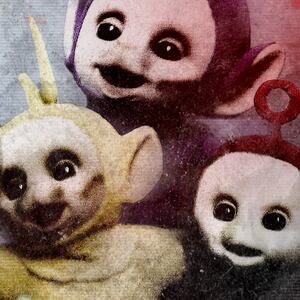The women are shaking their pom-poms a little differently in this season of Netflix’s America’s Sweethearts: Dallas Cowboys Cheerleaders. The surprising key to understanding why lies with the team director, Kelli Finglass, and, of all things, a throwaway comment about pantsuits.
It’s truly a “blink, and you will miss it” moment.
At the start of Season 2, the camera follows Finglass at her Texas home, where she’s working with her stylist to choose outfits for her on-camera appearances. After trying on a few jewel-toned sheath dresses and flowy options (think Fox News anchor meets Lara Trump), Finglass casually drops a suggestion.
“I like Kamala Harris’ pantsuits,” she declares.
On the surface, Finglass’ style choices seem irrelevant. Sure, she’s ditched the typical Republican-leaning sheath dresses, but who really cares about her wardrobe, right?
It’s not so much the shift in style that matters—it’s what it hints at: How the show, and the DCC, may be attempting to navigate the conservative politics that have long surrounded the squad for a more progressive audience.
When the first season made its Netflix debut in 2024, the show became an instant hit, quickly climbing the streaming platform’s Top 10 most-watched list. And it’s not hard to see why.
You see, the Dallas Cowboys Cheerleaders, often called DCC for short, aren’t just cheerleaders. Sure, the squad’s main job is to attend every Cowboys game, wowing the crowd with their perfectly synchronized high kicks and jump splits. But beneath the veneer of their iconic uniform, which consists of star-spangled hot pants and billowing blue sleeves, the DCC are also brand ambassadors, selling a very specific kind of woman.

The first season pulls back the curtain on the suffocating pressure to meet impossible standards. Thinly veiled comments about some cheerleaders needing to lose weight are frequent. The squad members are also held to a stringent code of conduct that extends far beyond the football field: no suggestive social media posts, no fraternizing with players, and back in the day, no wearing blue jeans in public. (Seriously, why was this a rule?)
After season one premiered, criticism about the team’s oppressive and misogynistic policies quickly followed. Publications including Vanity Fair and TIME magazine wrote think pieces musing on the complicated and “infuriating” feminist politics of the show.
YouTube essayist Elle Literacy even produced an hour-long video, Dallas Cowboys Cheerleaders: Exploitation in the Name of Patriotism, in which she delved into the cheerleaders’ shockingly low pay—barely above minimum wage until just recently.
In Season 2, however, it seems either the DCC or Netflix, or both, is reacting to some of the previous criticism.
The season starts with Finglass complimenting Kamala Harris’ pantsuits. As a reminder, the episodes were likely filmed around the time when the rumors about Harris taking over for Joe Biden as the 2024 Democratic presidential candidate first began.
The weight and aesthetic comments are also far less direct this season.
In one notable moment, rookie Abby Summers is fitted for her DCC uniform and, after the fitting, remarks that she “doesn’t need to hit the weight room anymore.” When asked who told her that, Summers cryptically responds: “I just figured it out... I don’t want to say who.”

As the season progresses, tension surfaces when veteran Chandi Dayle is demoted from her group leader role after a rule violation on a Bahamas trip. Dayle reportedly invited a man back to her hotel room, which, according to DCC’s strict code, is a serious breach.

Dayle’s demotion causes a rift in the team, with some seemingly upset over management’s decision while others appear to be unhappy with her continued presence on the team. The show leaves the specifics around the unhappiness towards Dayle unclear, but one can’t help but wonder whether Dayle’s punishment (and the cheerleaders response to it) stemmed from the transgression itself—or because her behavior didn’t align with the squad’s image of the “Southern good girl.”
Like the finale of Season 1, the show ends with the cheerleaders removing their makeup, a metaphor for seeing beneath the DCC “mask.” But this time, something feels off and sanitized, leaving viewers with a sense that all we got this season was a more carefully curated performance from the DCC.









